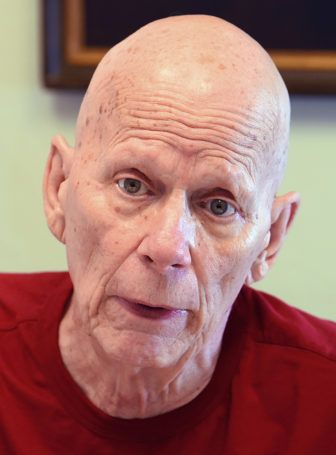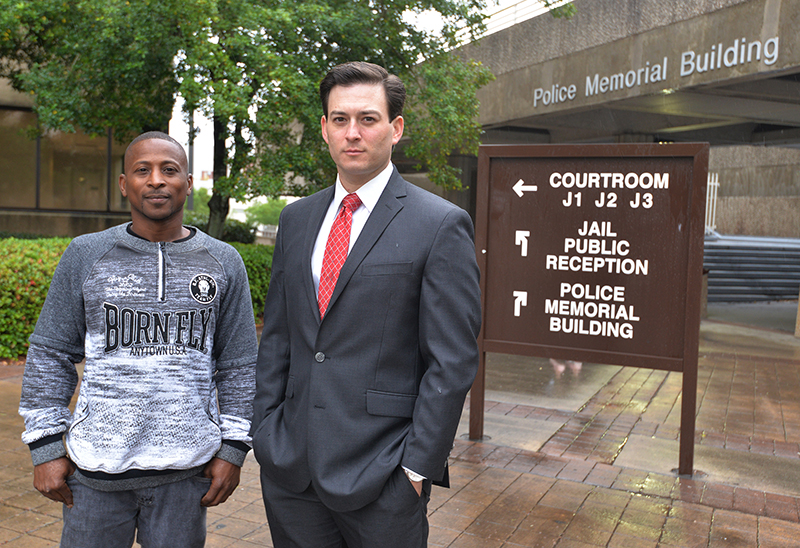Michael Mills had run-ins with the law in his younger, wilder days. Now he is 43, an automotive repairman and father of four who lives in Baldwin, Fla., a quasi-independent municipality in Jacksonville. He thought that was all far behind him until he was arrested in September 2018 on felony charges of impersonating a police officer.
As a small business owner, he had the means to pay a bail bonds company $1,500, representing the standard, nonrefundable 10% portion of his $15,000 bond that such businesses charge, to secure release the day of his arrest, and was able to afford a private attorney. The state later reduced the charge to a misdemeanor, which didn’t affect bond because he’d already paid.
In February, Mills’ attorney presented GPS data from his cellphone establishing that Mills could not have been in the vicinity where the alleged crime occurred. Weeks later, the charges were dropped — six months after Mills’ arrest. “Thank god I was able to bond out because I would have been in the jail that whole time,” Mills said. “… I could have lost my business, my income, everything for being incarcerated for a crime I didn’t even do.”
Criticisms of bail have been mounting for years, particularly regarding its impact on the poor and other marginalized communities, who often remain confined before trial, including for nonviolent, petty offenses.
The widespread practice of requiring bond on the vast majority of cases has led to what many describe as “wealth-based detention” based on means, rather than danger to the community or likelihood of fleeing.
Bail widespread in Florida
In Florida, where reforms are slow to arrive, cash bail remains the law of the land.
The practice varies widely by jurisdiction, with some making inroads to reform; others, like historically conservative Jacksonville, have been slower.
Historically, bail was intended to ensure a defendant’s appearance in court and protect the community from dangerous people.
Along with lengthy prison sentences, the tough-on-crime era ushered in higher bond amounts, and in some cases, denial of bond. Today many simply take for granted that the accused will either remain incarcerated or pay a significant sum to be released while charges are pending.
The system is responsible for lengthy detainments of thousands of technically innocent people every year. It has also given rise to a multibillion-dollar industry, one of only two such industries on the planet.
“I would get a lot of cases where the individual has a low bond and you would expect them to be out but they’re still in custody,” said Mills’ attorney Finley Williams, a former prosecutor who said it was often easier to work cases out if a defendant was in custody and thus more amenable to the state’s offer of a plea deal. “… They’re charged with something minor, but they end up sitting in jail for a couple of weeks, a month, until their first court date when they get an offer.”
Reform advocates in Florida have for years complained that this violates both the federal and state constitutions, the latter of which commands courts to release all defendants pretrial “on reasonable conditions” unless they are charged with a capital offense or one punishable by life in prison and their guilt is either evident or highly likely. In practice, such constitutional requirements are often simply ignored.
Results in Jacksonville
Incarceration for any length of time can cause an avalanche of repercussions in someone’s life. Jobs, houses, relationships, vehicles, even custody of children can all be lost while a case works through the system. Even short jail stints also increase the likelihood of reoffending and diminish one’s ability to fight the charges against them.

Jackie Azis
While someone is incarcerated, they are unable to access witnesses, documents, etc., which hinders their ability to mount an effective defense, Jackie Azis, an attorney with the American Civil Liberties Union, pointed out. Williams said that if Mills had been detained pretrial, they might not have had access to his cellphone, which contained the GPS-based data that facilitated his exoneration.
“Usually to detain someone pretrial you have to go through certain due process steps. Those steps are not being followed in Florida; instead they’re just giving people unaffordable bond,” Azis said.
A judge can set a bond commensurate with ability to pay by simply asking the defendant what they can afford, she said. Prosecutors can also facilitate pretrial release by not seeking bond on cases where it is deemed appropriate, such as low-level misdemeanors, she said.
Instead, in Jacksonville, the Department of Corrections reports that in December 2018, an average inmate population of 564 defendants were detained pretrial on misdemeanor charges, representing nearly 20% of the total average jail population. This is a significantly higher number of misdemeanor pretrial detainees than any other county in Florida; the next highest was Orlando’s Orange County, which detained 256 misdemeanor defendants pretrial that month, despite having a much larger population than Jacksonville.

HG.org
Raymond Forbess
“They’re normally going to plea to get out,” said criminal defense attorney Raymond Forbess. “It’s very rare that I can convince them to stay in.”
Asked about the relatively high numbers of misdemeanor detainees, the 4th Judicial Circuit State Attorney’s Office (SAO), which serves Jacksonville, said that while the court often determines bond, its “primary consideration” in making bond recommendations is protecting the community. “For pretrial detention, our focus is on those defendants who pose a threat to the safety of the community or are a flight risk, meaning they are unlikely to appear for trial,” the office wrote via email, adding that for other defendants it recommends “reasonable conditions of release.”
According to data provided by the Jacksonville Sheriff’s Office (JSO) in response to records requests, of the 2,986 inmates being held on March 29, 1,986, or nearly two-thirds, had not yet been sentenced; 253 unsentenced inmates were facing misdemeanor charges. Of these, many will ultimately take a plea to secure release.
Although society has come to reflexively accept bail as necessary to secure appearance in court, the statistics say otherwise. All the defense attorneys quoted in this story said that defendants do flee sometimes, though rarely. Even more rare is them not getting caught, particularly now in the era of the internet, facial recognition technology, GPS and other innovations that have made it far more difficult to evade prosecution for any length of time. When they get caught, having fled often negatively impacts the outcome.
For more information on Racial-Ethnic Fairness, go to JJIE Resource Hub | Racial-Ethnic Fairness
The issue of bail is further distorted by racial disparities in the criminal justice system. According to JSO’s Inmate Population Summary, of the 32,616 inmates admitted in 2018, more than half, 16,992, were black. The U.S. Census Bureau reports that 30.5% of Jacksonville residents are black.
Minorities are also detained for disproportionate lengths of time. In 2018, on average, the average length of stay for black inmates was more than a week longer than for white inmates; 38.9 days versus 30.65 days, respectively. These data points necessarily lead to the conclusion that black people in Jacksonville are far more likely to be arrested; and, if arrested, will probably remain detained longer.
Effect on recidivism?
R Street Institute fellow Arthur L. Rizer III, a former police officer and prosecutor, noted in a National Affairs essay that, compared to those who spend less than a day locked up, after just three days in jail, the odds someone will reoffend within two years of release increase by 17%; at four to seven days, the odds increase 35%; at eight to 14 days, 51%.
Judges and prosecutors do have options other than bail, such as releasing defendants on their own recognizance, or letting them out with a GPS or SCRAM (alcohol sensor) monitor, but use varies widely. Getting released on recognizance (ROR), the least disruptive alternative, is relatively rare in Jacksonville. For the first week of March, the city released 712 defendants; only 10% were given ROR, while 38%, or 270, paid some form of bail.
Although many may prefer them to sitting in lockup, both of the monitors can be extremely costly — at a recent first appearance, a judge in Jacksonville warned a defendant that the SCRAM monitor costs $12 per day. “Ankle monitors can become so expensive that people are ready to plea,” Forbess said.
What’s being done
The ACLU is currently challenging the bail system in Leon County (which encompasses state capital Tallahassee, about three hours west of Jacksonville) on constitutional grounds.

Bob Mack
William Sheppard
Law firm Sheppard, White, Kachergus & DeMaggio filed a federal lawsuit challenging the misdemeanor bond system in the 4th Judicial Circuit in 2017 arguing that judges were failing to determine ability to pay before deciding bond, leading to wealth-based detention. Last September, the suit was dismissed without prejudice, allowing the firm to refile the complaint after amending it, or file it in state court.
U.S. District Judge Brian Davis wrote in his dismissal, “If the judges in Duval County, Florida are not considering an accused’s financial ability to post a bond when setting bond amounts, then they are violating not only Florida’s Constitution and its Rules of Criminal Procedure, but arguably they act in violation of the Eighth and Fourteenth Amendments to the United States Constitution.”
Attorney William Sheppard, who filed the case, said they intend to refile in state court this month. “What astonishes me is, having filed suit, the judiciary knows about it, they know what’s wrong; the prosecutor knows about it, they know what’s wrong,” he said. “The public defender knows about it, he knows what’s wrong. And not a one of them does a damn thing about it, except to ignore it, and to defend it and to resist it.”
Federal courts are divided on the constitutionality of detaining defendants solely because they cannot afford bail. On April 1, the U.S. Supreme Court declined to review a case challenging Georgia’s bail system, which was complicated by the fact that, shortly after the plaintiff filed suit, the state updated its policy to require a hearing on the affordability of bail within 48 hours of arrest.
Elsewhere there are lawsuits and legislation aimed at reform, including in Florida, where in addition to the ACLU case challenging bail in Leon County, a state senator has proposed a bill that would authorize jurisdictions to implement a risk assessment system for determining eligibility for pretrial release. These are part of a growing drumbeat urging widespread reform of the monetary bail system that penalizes the accused based on wealth.
After an arrest, a defendant will quickly be arraigned. For misdemeanor defendants in Jacksonville, as in most places, the first appearance may last a few minutes. That’s when the court will determine indigency, charges will be formally announced, the state may make an offer and bail will be set. Defendants routinely accept offers from the state at this hearing or later, simply to get out of jail — even if their attorney urges them to fight the charges.
Results of overcharging
One long-running complaint about the criminal justice system is that prosecutors tend to overcharge, the effect of which is twofold. First, it incentivizes accepting guilty pleas rather than taking a case to trial and risking a long prison sentence. Second, it makes bond significantly higher.
Artist Sam North, 33, better known as Sammy thrashLife, has firsthand experience with being charged with multiple crimes for a single offense. In 2016 he was accused of driving under the influence stemming from a car crash in which he hit one car, which hit another. No one was injured. A Jacksonville prosecutor charged North with three DUIs stemming from the accident, in spite of the fact that he could not have been sentenced for more than one DUI associated with a single incident. “Anytime you get arrested, they try to stack up as many charges as possible to scare you into making a deal … or make it so your bond is more expensive,” North said.
Former prosecutor Williams, now a criminal defense attorney, said charging for duplicate crimes is commonplace. “When you steal [something] and pawn it, they’ll charge you with dealing with stolen property and grand theft,” he said. “…They catch bonds on both of them […] then at the end of the day, they can’t actually be charged with both.”
The SAO counters that the U.S. Supreme Court has held that it is legally permissible to file multiple charges in such circumstances under a legal concept known as unit of prosecution, where the number of victims determines the number of charges, which gives the court legal basis for awarding restitution to each. It is not necessary, however, to recommend bond for each charge and, in practice, defense attorneys said that some judges, though usually not in Duval County, will only order bond on one.
For his charges, North’s bond was set at $14,012; $10,003 for a felony battery on an officer for allegedly spitting on a security guard in the hospital after the crash, $2,503 for the first DUI and $753 for each of the other two. North, who qualified for indigency status and was appointed a public defender, could not afford bail, so he sat in jail for days.
There he was surrounded by people awaiting trial or an offer from the state of time served because they couldn’t or didn’t want to post bond. “For the most part everybody is looking to get whatever deal they can whether they’re guilty or not,” he said.
Copping to a plea just to get out of jail can have negative repercussions down the road, Mills said. “They use that same thing that you didn’t do that you pled out to to penalize you and enhance your sentence for something you actually did do,” he said.
Within weeks, North’s felony would be reduced to a misdemeanor, which could technically enable him to argue for a bond reduction, but by that time, he had convinced a relative to bail him out. He later took a plea of probation, fines and a sentence of time served.
North views pretrial detention as punishment. “You’re already serving a sentence without being convicted,” he said. “It’s a complete violation of due process.” He eventually violated the terms of his probation and left the jurisdiction because, he says, he wasn’t sure how long he’d have to sit in jail. “The only reason I didn’t turn myself in on the warrant was because I didn’t have money for bail,” he said.
After decades of leading the way in reform, Washington, D.C. officially did away with its monetary bail system in 1992. Today more than 90% of defendants there are released without any bond. Records show that 90% of those released make all court appearances, and 91% complete pretrial without new arrests, according to the Pretrial Justice Institute. Such reforms also save the government the costs of housing those accused of crime, which typically costs jurisdictions many millions of dollars every year.
More recently, New Jersey eliminated bail for most minor crimes in 2017; last summer, California abolished bail nearly four decades after Gov. Jerry Brown decried it for punishing poverty, rather than crime.
“You’re not more or less dangerous to the community because you have money,” Forbess said.
This project was collaboratively produced with Jaxlookout and underwritten in part by The Vital Projects Fund.

I believe Bail Reform has a negative impact on the economies where bail bond agencies operate. This could do away with jobs provided by the bail bonds industry.
False
Pingback: Florida’s Bail System Hasn’t Changed in Jacksonville - Bail Bond News Blog